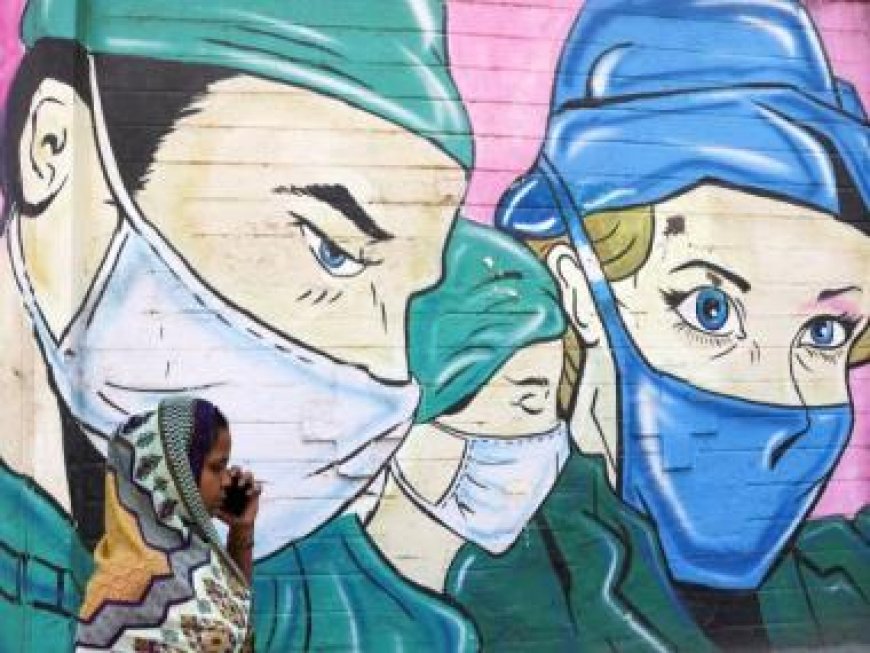Is COVID-19 leading to more heart attacks in India?
Is COVID-19 leading to more heart attacks in India?

India’s celebration of Navratri has just come to a conclusion. However, the festivities and celebrations were a bit muted after 10 people passed away while performing garba in Gujarat within 24 hours.
Following this, Union Health Minister Mansukh Mandaviya on Sunday issued an advisory, requesting people who have suffered from COVID-19 not to do hard work or strenuous activity for some time in order to avoid heart attacks.
On the sidelines of an event he was attending in Bhavnagar in Gujarat, Mandaviya said that the Indian Council of Medical Research (ICMR) had done a detailed study on the subject and advised that those who had recovered from severe COVID infections should not exert themselves. “The ICMR has done a detailed study recently. That detailed study has recommended that those who had severe COVID should desist from extra labour; that they should stay away from continuous labour, laborious running, exercise, etc, for a specified short period, meaning a year or two, so that heart attacks can be prevented,” Mandaviya said.
We take a closer look at what the ICMR has found about heart attacks and COVID and what studies have so far revealed about the link between the two.
Link between heart attacks and COVID
The ICMR report in a detailed study has found that those who had severe COVID should desist from extra labour; that they should stay away from continuous labour, laborious running, exercise, etc, for a specified short period, meaning a year or two, so that heart attacks can be prevented.
Previously, the National Institutes of Health had found that a COVID-19 infection could affect the artery wall tissue and the associated macrophages. “The findings suggest that SARS-CoV-2 may increase the risk of heart attacks and stroke by infecting artery wall tissue, including associated macrophages. This provokes inflammation in atherosclerotic plaques, which could lead to heart attack or stroke,” it said.
Other research and doctors have also found that COVID can trigger heart-related ailments, including heart attacks. Dr Ajay Kaul, Chairman of Cardiac Sciences at Fortis Hospital, had told India Today earlier that COVID has been shown to increase the risk of blood clot formation, which can affect the blood vessels supplying the heart. This may lead to heart attacks and other cardiac issues.
Most doctors, at home as well as globally, have observed that COVID stimulates widespread inflammation. “We know that inflammation itself increases our cardiovascular risk,” Dr Luke Laffin, a cardiologist and co-director of the Centre for Blood Pressure Disorders at the Cleveland Clinic told the New York Times. “We know that infectious diseases, particularly severe COVID-19 infections, lead to inflammation. So could that be the mechanism by which there’s increased risk? Maybe.”

And this is only in the short term. However, a study has shown that people had a significantly higher risk of developing virtually all heart-related diseases in the year after a COVID infection. According to the research, people were one-and-a-half times more likely to have a stroke, nearly twice as likely to have a heart attack, and had between 1.6 and 2.4 times the risk of developing different types of arrhythmias.
Also read: COVID-19’s new strain ‘Pirola’ or BA.2.86 rapidly increasing: Should India be concerned?
Some doctors also note that COVID is associated with diseases related to heart ailments, mainly hypertension. This was illustrated through a study which found that nearly 21 per cent of people who were hospitalised after testing positive for the infection, and close to 11 per cent, who had contracted a milder infection and not hospitalised, developed high blood pressure in the following months.
Neither the study nor the doctors have been able to explain how COVID causes hypertension, but the study does, in fact, prove the link. And we all are aware of how hypertension can affect the heart.
Experts from John Hopkins Medicine have revealed that COVID-19 can also cause cardiomyopathy, which is a heart muscle disorder that affects the heart’s ability to pump blood.
Heart attacks on the rise in India
Ever since the COVID pandemic, India has seen a rise in heart ailments. In fact, the recent deaths in Gujarat have once again thrown light on the rising number of deaths owing to heart attacks in the country.
According to data released by the National Crime Records Bureau, the number of deaths due to heart attacks in India has remained consistently over 25,000 in the last four years, and over 28,000 in the last three years.

Another survey has also confirmed that there has been a 21 per cent increase in people who have had one or more of their close contacts experience brain stroke, cardiac arrest, heart attack and cancer acceleration in the past year.
Also read: Young India’s weak hearts and how we can protect them
The survey, carried out across 322 districts in India, found that 72 per cent reported one or more in their close social network of experiencing medical conditions like brain stroke, cardiac arrest, heart attack and cancer acceleration in the last three-and-a-half-years post March 2020 following the COVID-19 pandemic outbreak in India.
The survey by LocalCircles also found that the percentage of citizens with such cases amongst their close contacts increased by 21 per cent from October 2022 to October 2023.
“In our October 2022 study, 51 per centof people had indicated having one or more close contacts with the onset of a severe medical condition since COVID. But in the last 12 months, this has risen to 72 per cent of respondents having one or more close contact with the onset of severe medical conditions,” Sachin Taparia, founder of LocalCircles, was quoted as telling New Indian Express.
A worldwide situation
And this trend isn’t limited to India alone. In the US, it was reported that in the year before the pandemic, there were 1,43,787 heart attack deaths; within the first year of the pandemic, this number had increased by 14 per cent to 1,64,096. And by the second year of the pandemic, the “observed” compared to “predicted” rates of heart attack death had increased by 29.9 per cent for adults ages 25-44, by 19.6 per cent for adults ages 45-64, and by 13.7 per cent for adults age 65 and older.
In the United Kingdom, health bosses have said that there have been almost 100,000 excess deaths since the start of the COVID pandemic. Analysis of official government data suggests that more than 500 people a week are dying needlessly from heart disease, heart attacks or strokes. There have been 96,540 extra cardiovascular-related deaths since March 2020, according to the report by the British Heart Foundation.
In the first year of the pandemic, COVID-19 infections led to a surge in excess cardiovascular deaths, the charity said. But while deaths from COVID-19 have since fallen, the number of cardiovascular disease deaths has remained much higher than expected.
With inputs from agencies
What's Your Reaction?


























































